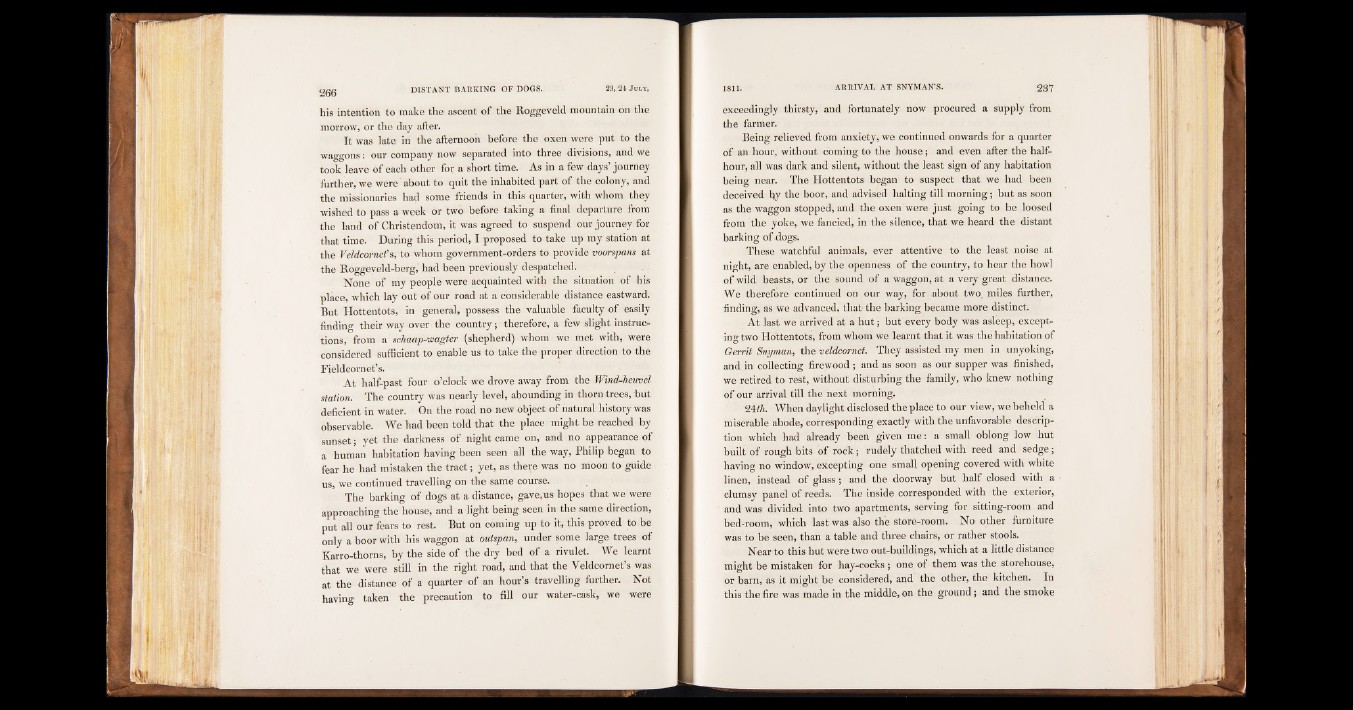
his intention to make the ascent of the Roggeveld mountain on the
morrow, or the day after.
It was late in the afternoon before the oxen were put to the
waggons: our company now separated into three divisions, and we
took leave of each other for a short time. As in a few days’ journey
further, we were about to quit the inhabited part of the colony, and
the missionaries had some friends in this quarter, with whom they
wished to pass a week or two before taking a final departure from
the land of Christendom, it was agreed to suspend our journey for
that time. During this period, I proposed to take up my station at
the Veldcomet’s, to whom government-orders to provide voqrspam at
the Roggeveld-berg,' had been previously despatched.
None of my people were acquainted with the situation of his
place, which lay out of our road at a considerable distance eastward.
But Hottentots, in general, possess the valuable faculty of easily
finding their way over the country; therefore, a few slight instructions,
from a schaap-wagter (shepherd) whom we met with, were
considered sufficient to enable us to take the proper direction to the
Fieldcornet’s.
At half-past four o’clock we drove away from the Wind-heuvel
station. The country was nearly level, abounding in thorn trees, but
deficient in water. On the road no new object of natural history was
observable. We had been told that the place might be reached by
sunset; yet the darkness of night came on, and no appearance of
a human habitation having been seen all the way, Philip began to
fear he had mistaken the tract; yet, as there was no moon to guide
us, we continued travelling on the same course.
The barking of dogs at a distance, gave.us hopes that we were
approaching the house, and a light being seen in the same direction,
put all our fears to rest. But on coming up to it, this proved to be
only a boor with his waggon at outspan, under some large trees of
Karro-thorns, by the side of the dry bed of a rivulet. We learnt
that we were still in the right road, and that the Veldcornet’s was
at the distance of a quarter of an hour’s travelling further. Not
having taken the precaution to fill our water-cask, we were
exceedingly thirsty, and fortunately now procured a supply from
the farmer.
Being relieved from anxiety, we continued onwards for a quarter
of an hour, without coming to the house; and even after the half-
hour, all was dark and silent, without the least sign of any habitation
being near. The Hottentots began to suspect that we had been
deceived by the boor, and advised halting till morning; but as soon
as the waggon stopped, and the oxen were just going to be loosed
from the yoke, we fancied, in the silence, that we heard the distant
barking of dogs.
These watchful animals, ever attentive to the least noise at
night, are enabled, by the openness of the country, to hear the howl
of wild beasts, or the sound of a waggon, at a very great distance.
We therefore continued on our way, for about two. miles further,
finding, as we advanced, that the barking became more distinct.
At last we arrived at a h u t; but every body was asleep, excepting
two Hottentots, from whom we learnt that it was the habitation of
Gerrit Snyman, the veldcornet. They assisted my men in unyoking,
and in collecting firewood; and as soon as our supper was finished,
we retired to rest, without disturbing the family, who knew nothing
of our arrival till the next morning.
<2ith. When daylight disclosed the place to our view, we beheld a
miserable abode, corresponding exactly with the unfavorable description
which had already been given me: a small oblong low hut
built of rough bits of rock; rudely thatched with reed and sedge;
having no window, excepting one small opening covered with white
linen, instead of glass; and the doorway but half closed with a
clumsy panel of reeds. The inside corresponded with the exterior,
and was divided into two apartments,, serving for sitting-room and
bed-room, which last was also the store-room. No other furniture
was to be seen, than a table and three chairs, or rather stools.
Near to this hut were two out-buildings, which at a little distance
might be mistaken for hay-cocks ; one. of them was the storehouse,
or barn, as it might be considered, and the other, the kitchen. In
this the fire was made in the middle, on the ground; and the smoke